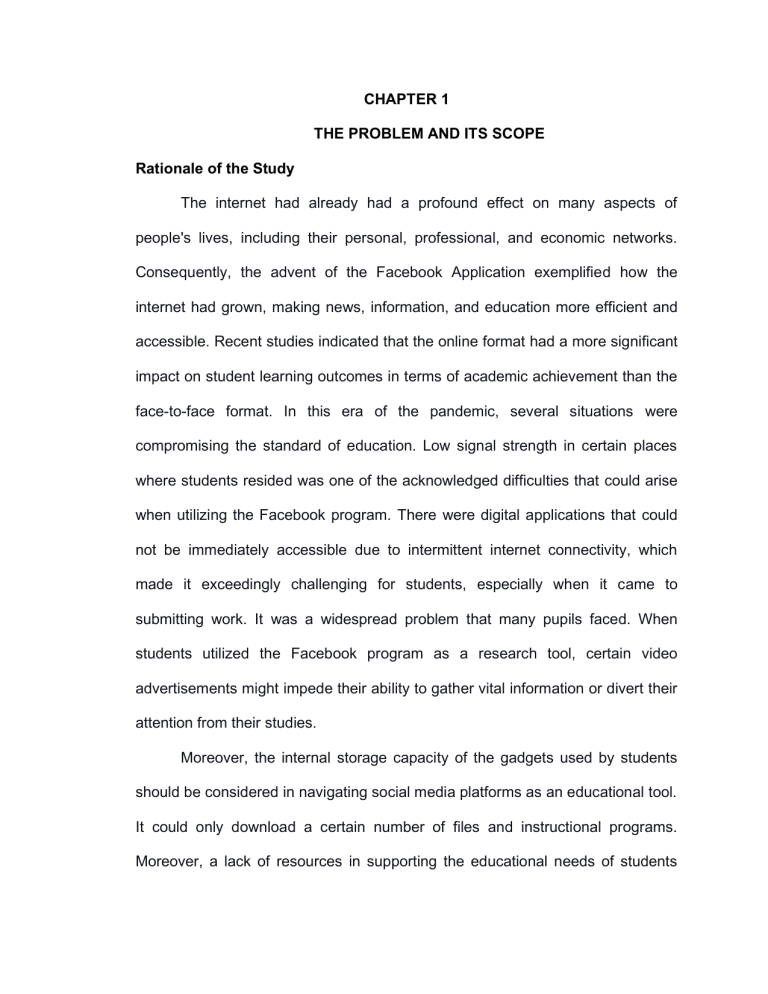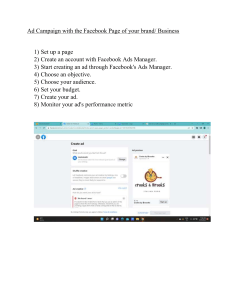
CHAPTER 1 THE PROBLEM AND ITS SCOPE Rationale of the Study The internet had already had a profound effect on many aspects of people's lives, including their personal, professional, and economic networks. Consequently, the advent of the Facebook Application exemplified how the internet had grown, making news, information, and education more efficient and accessible. Recent studies indicated that the online format had a more significant impact on student learning outcomes in terms of academic achievement than the face-to-face format. In this era of the pandemic, several situations were compromising the standard of education. Low signal strength in certain places where students resided was one of the acknowledged difficulties that could arise when utilizing the Facebook program. There were digital applications that could not be immediately accessible due to intermittent internet connectivity, which made it exceedingly challenging for students, especially when it came to submitting work. It was a widespread problem that many pupils faced. When students utilized the Facebook program as a research tool, certain video advertisements might impede their ability to gather vital information or divert their attention from their studies. Moreover, the internal storage capacity of the gadgets used by students should be considered in navigating social media platforms as an educational tool. It could only download a certain number of files and instructional programs. Moreover, a lack of resources in supporting the educational needs of students 2 during a performance-based assignment led to increased expenditures, and unnecessary pop-up notifications disrupted virtual meetings and academic work. In contrast, face-to-face learning contrasted with online learning (e.g., Ryan et al. 2016). Its most noteworthy characteristic was the absence of a physical classroom, replaced by web-based tools that enabled out-of-class learning at any time, location, or speed (Bernard et al., 2014; Chigeza and Halbert, 2014; Northey et al., 2015; Israel, 2015; Potter 2015). According to Ryan et al. (2016), "in the context of higher education, the term online learning was frequently construed as referring to fully online courses. However, the scope of these studies focused only on the substantial outer aspect of the study and disregarded several vital aspects. Such as determining the veracity of student performances and the availability and convenience of these platforms in providing feedback to students; the scope of these studies focused only on the substantial outer aspect of the study and disregards several vital aspects of the study, such as determining the veracity of student performances. Therefore, this research was quite helpful since it tackled the influence and efficacy of Facebook and determined what action plan had to be offered to provide quality education in the absence of face-to-face instruction. Theoretical Background of the Study This article assumed that Facebook had a significant impact on the academic performance of students. Similarly, this study was predicated on the Social Learning Theory of Albert Bandura and Raymond Williams' Media theory. 3 The Social Learning Theory. Bandura's social learning theory emphasized the importance of seeing, emulating, and modeling others' behaviors, attitudes, and emotional responses. According to social learning theory, environmental and cognitive factors impacted human learning and behavior. According to Bandura's Social Learning Theory, individual learners, peers, and environments could impact individual learning results. Albert Bandura's Social Learning Theory (SLT) would improve comprehension of two aspects of the project: educational usage of social media and academic performance. According to Ainin et al., the Social Learning Theory described how environmental and cognitive factors influenced a person's behavior and learning pattern. According to the Social Learning Theory, learning was a social process in which individuals self-initiated, controlled, and made a determined effort to gain knowledge via their efforts, producing, and connecting information. According to this theory, learners acquired skills entirely within their environment and among their peers due to their frequent educational usage of social media. According to the concept, students learned from one another through observation, imitation, and modeling, resulting in positive learning outcomes. Based on Bandura's Social Learning Theory, it was proposed that students' use of social media for educational purposes would assist them in acquiring the skills and knowledge necessary to improve their academic performance. Students developed their sense of self-efficacy by analyzing information from four primary sources: mastery experience, vicarious experience, verbal persuasion, and physiological arousal. According to Bandura, the most potent source of efficacy 4 was mastery experience. Students participated in activities to help them achieve their learning objectives, interpret the results of their actions, apply what they have learned to improve their views about their abilities to participate in tasks or activities and collaborate based on these beliefs. In addition, the appropriateness of a person's competence was crucial when it came to the development of selfefficacy. Vicarious experience, also known as modeling, was a form of observational learning in which self-efficacy beliefs developed through seeing the success of others. Media Theory by Raymond Williams. Different social media sites, such as Facebook, had been praised for offering new, socially-engaged educational experiences for undergraduate, self-directed, and other students. To place and qualify this promise, however, required a theoretical and historical assessment of these media in light of earlier media shifts. Mainly, the research on key social media platforms presented here raises the question of whether or not social media platforms fostered an essential element of learning - the capacity to dispute and disagree. Using the analytical framework of media theorist Raymond Williams, who highlighted the role of advertising in the content and form of television, the researchers examined the circumstances of top social networking sites as boundaries for debate and, consequently, learning. Canadian communications theorist, Marshall McLuhan, was among the academics who challenged William's Media Theory. His research examined the hypothesis that how societies communicated with one another via media technologies affected both society and its inhabitants. In other words, the form of media affected the 5 medium's content. According to McLuhan, the key to understanding electronic culture was neither the technologies themselves nor the "content" of writing or print speech (McLuhan 1964: 26). Understanding how media technologies subtly influenced the environment in which people operated and interact was the primary obstacle. In the context of the internet and digital media, the frameworks offered by Williams and McLuhan differ considerably in their focalization. The social shaping of technology approach advocated by Williams focuses on the decisions made during the development and adoption of new media technologies, as well as who, what groups, and what social institutions had the authority to make such decisions and what alternative uses were possible for these technologies. These ideas possessed a high degree of applicability. They served as the foundation for this study, which aimed to establish the level of Facebook usage among public university students and its effect on their academic performance. 6 SOCIAL MEDIA LEARNING THEORY MEDIA THEORY These theories signified a great relevance and thus, anchor this study which sought to determine the state university students’ level of Facebook usage and its impact on their academic performance. ACTION PLAN Future research should investigate the relationships between Facebook as a learning tools Facebook use for academic performance; Teacher’s use of Facebook for classroom activities; and the proper utilization of Facebook to effectively facilitate academic discussions. PROPOSED ACTION PLAN Expand student awareness of the benefits, expectations, and demands of using Facebook. Figure 1 Theoretical Background of the Study 7 Statement of the Problem This study determined the effect of Facebook usage to the academic performance of the state university students during Academic Year 2021-2022 as a basis for the proposed action plan. Specifically, it sought answers to the following questions: 1. What is the respondents’ demographic level in terms of: 1.1 Age; 1.2 Gender; and, 1.3 Study hours? 2. What is the respondents’ level of Facebook usage? 3. What are the respondents’ academic performance based on their General Weighted Average? 4. Is there a significant relationship between the respondents’ demographic level and Facebook usage? 5. Is there a significant relationship between the respondents’ level of Facebook usage and their academic performance? 6. Based on the findings of the study, what action plan can be proposed? Hypothesis The study was guided by the null hypothesis. Ho: There was no significant relationship between the student's level of Facebook usage and academic performance. 8 Significance of the Study This study accommodated the recipient of the research. School Administrator. The school administrators would benefit from this study, as it would serve as their bases on how they could help the students to continue learning in condition of virtual learning in relation to student skill performance. Teachers. Teachers would benefit this study as giving instructions to the learners would become more convenient. It also built foundation in communicating their learners through virtual meetings. Online Learners. During this time of pandemic, learners intended to be efficient in compiling their outputs through Facebook. So, the result of this study would benefit the online learners as they became wide-awake with the virtual world. Future Researchers. Future researchers would benefit from the study as it would serve as a guide and a source in conducting research studies related to the utilization of Facebook as the social media platform for learning. Definition of Terms For a clear understanding of this study, the following terms were technically and comprehensively defined: Academic Performance. The degree to which a student, instructor, or institution had met their short-term or long-term educational objectives, based on the general weighted average of the replies. Action Plan. It was the outcome or product of the investigation. 9 Age. The length of time that a person or object had lived or existed. Demographic Profile. It included in the profile were the common features of the responders, such as age and gender. Facebook. This phrase referred to the popular, free social networking website that allowed registered users to build profiles, post photographs and videos, send messages, and stay in touch with friends, family, and coworkers. Facebook Usage. The extent to which respondents utilize Facebook for a certain reason, whether educational or unrelated to scholarship. Gender. Either of the two sexes (male or female), especially when social and cultural differences were emphasized over biological ones. General Weighted Average. The respondent's grade for a certain academic year. Influence. To cause someone to alter their behavior, beliefs, or opinions, or to modify anything. Study Hours. The amount of time spent by respondents on school-related activities and/or duties.


